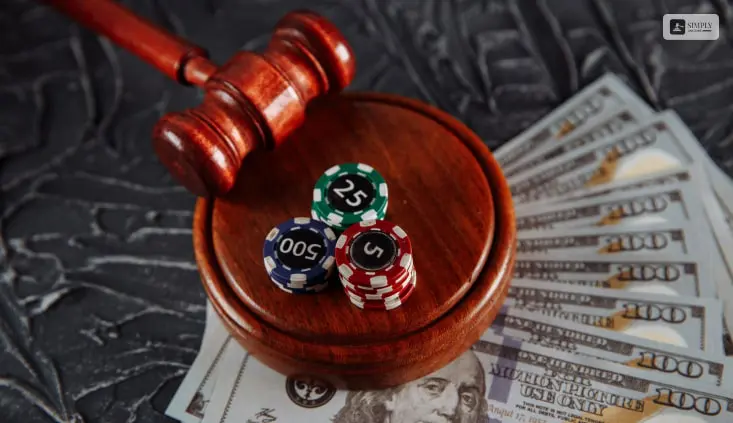
According to the law in the United States, gambling is the act of placing a bet or a wager. These are usually placed on an event or game of chance. People placing the bet either win money or something valuable.
These are the basic components of gambling.
- Mandatory Consideration: Gambling is the exchange of something valuable, such as cash, gold, or a priced possession, to participate in the event. Without that, it is merely a gift or a loan.
- An event of Chance: Whether the people participating will win depends predominantly on chance and not practice or skill. If the skill does play an important role in the results, it will be classified as a contest.
- Prize: There must be a prize of any valuable item or even money that the people participating will win.
- Risk: Gambling always involves risk. The people participating always stand at a 50-50 risk of winning or losing what they bet.
Louisiana Gambling Laws: Federal Laws Governing Them

Although the state of Louisiana has its own gambling laws, rules, and regulations, these are the federal laws that shape Louisiana’s Gambling Laws.
Federal gambling laws in the United States consist of a varied range of statutes. They govern almost all gambling activities that residents of the United States could participate in. Here are some of the top-operating federal gambling laws:
The Interstate Wire Act, 1961 (18 of the United States Code)
This is commonly known as the Wire Act. It prohibits US residents from using wire communication facilities to transmit messages regarding bets, wagers, or other gambling practices through the state or international borders. It was introduced to target sports betting. However, it now applies and regulates other forms of online gambling.
The Unlawful Internet Gambling Enforcement Act (UIGEA), 2006 (31 of United States Code)
This Act prohibits the acceptance of payments and wagers related to unlawful Internet gambling activities. It places restrictions on financial transactions, aiming to prevent the use of financial institutions for illegal online gambling.
The Professional and Amateur Sports Protection Act (PASPA),1992
PASPA states that it is illegal for any State to authorize betting on sports. However, there are a few exceptions for States which had already existing sports betting laws. This Act was soon(2018) declared to be unconstitutional by the Supreme Court.
The Indian Gaming Regulatory Act (IGRA), 1988
This Act gives a framework of Louisiana gambling laws on land that regulate tribal gaming. It has jurisdiction over all Native American lands in the USA. It also establishes the circumstances that permit Native American tribes to operate casinos. They can negotiate on gaming compacts with the governments of their respective states.
The Federal Anti-Lottery Laws
This consists of a group of laws, including the Postal Lottery Statute and the Lottery Statute. These prohibit a citizen from mailing or transporting gambling-related items such as lottery tickets interstate or across national borders to foreign commerce.
While these federal laws make up the baseline, gambling regulations are mostly functional at the state level. Each state has been vested with the authority to enact its own laws related to gambling. Those include provisions for gambling offline and online, land-based casinos, and all other forms of gaming.
Louisiana Gambling Laws
Louisiana gambling laws are the regulation that governs various forms of gambling activities in the jurisdiction of the state. These are the key aspects of Louisiana gambling laws.
Legalized Gambling in Louisiana Louisiana permits multiple forms of gambling. Casino gambling, poker by video, horse racing, and state lotteries all of these are permitted in the state, provided they abide by state laws regarding them. Casino gambling is only considered legal in licensed riverboat casinos, land-based casinos, and racetrack casinos.
Louisiana Gambling Law Age Restrictions
The legal age for a resident to participate in any form of gambling in the state of Louisiana is 21 years of age. 18-year-olds and above can participate in pari-mutuel horse betting and even buy lottery tickets.
Casino Gambling Laws Louisiana

These allow in-state casino gambling on riverboats, land-based casinos, and even racetracks. Riverboat casinos are the ones that operate on waterways, while land-based casinos are casinos that are situated on tribal lands. These casinos contain table games, slot machines, and other electronic gaming devices.
Horse Racing Gambling
Horse racing enjoys a legal status in Louisiana. It is a much-enjoyed sport as well. Louisiana has several racetracks where racing enthusiasts come to watch live racing and bet on games. Parimutuel wagering (wagers placing bets against one another) is also carried out in this state.
Video Poker
Video poker is legal in bars, restaurants, and other public places all across the state of Louisiana. There are also strict regulations governing the operation of these events. These include strict licenses and other limitations on the number of machines permitted at each place.
Apart from these, the Louisiana Gambling Laws allow for a state lottery, with provisions for draw games, scratch tickets, and other games (Powerball, Mega Millions, etc). All players participating must be 18 years or older. Social gambling is also permitted by state law in private residences. However, online Louisiana gambling laws are relatively limiting.
Wrapping It Up!
Louisiana gambling laws provide a compact and practical framework to regulate various forms of gambling in and across the state. These have the aim of balancing consumer protection and revenue generation while promoting responsible gambling practices. The presence of these laws fosters a safe and transparent environment for participants.
Louisiana’s gambling laws and safe gambling practices contribute to the economy by means of job creation, tourist attraction, and revenue generation. This revenue is often used for supporting education and development or other forms of public services that benefit the community.
I hope you enjoyed reading this article!
Let us know if you found it informative.
Read More:


